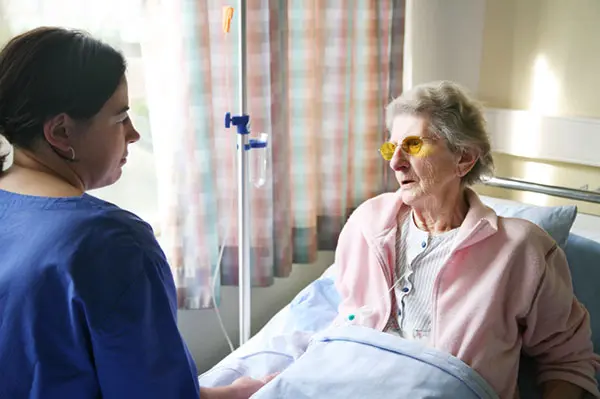Miami Nurse Medical Malpractice Attorneys
Helping Victims of Nurse Malpractice and Hospital Negligence throughout Florida
 Nurses play a crucial role in health care. In hospitals, clinics, nursing homes and other health care settings, they are the primary providers of patient care, responsible for monitoring and assessing patients’ conditions, administering medication and other therapies, utilizing complex technology and equipment to support patient care and reporting accurately on their patients’ conditions. When nurses do not fulfill these responsibilities correctly or appropriately, their patients can suffer serious, even life-threatening or fatal injuries.
Nurses play a crucial role in health care. In hospitals, clinics, nursing homes and other health care settings, they are the primary providers of patient care, responsible for monitoring and assessing patients’ conditions, administering medication and other therapies, utilizing complex technology and equipment to support patient care and reporting accurately on their patients’ conditions. When nurses do not fulfill these responsibilities correctly or appropriately, their patients can suffer serious, even life-threatening or fatal injuries.
Under Florida law, nurses have a duty to provide care that meets the accepted standard of care for nurses in their position. In other words, they need to provide the same quality of care that other reasonably prudent nurses would provide in the same circumstances. If a patient is injured as a result of a nurse’s negligence in not meeting the accepted quality of care, the patient has the right to take legal action to hold the nurse, and the facility or hospital that employs them, liable for medical malpractice. As a result, the patient injured by this medical negligence will be entitled to recover compensatory damages in proportion to the seriousness of their injuries.
If you or a loved one has been injured as a result of negligent nursing care, you may be able to file a Florida medical malpractice claim and potentially receive substantial compensation for your medical expenses, lost income, pain, suffering, and other damages related to the nurse malpractice. The Miami medical malpractice attorneys of Boyers Law Group have over twenty-five years of successful experience helping people injured by medical malpractice achieve justice. We would be honored to put our experience, skill and resources to work pursuing justice and the substantial compensation you deserve.
What Causes Florida Nurse Medical Malpractice?
Nursing malpractice can occur when nurses, like some doctors, do not listen carefully to patients, do not note or appreciate the significance of abnormal symptoms or vital signs, do not carry out “stat” orders immediately, do not call doctors when necessary, do not administer medication properly, do not take necessary safety precautions, do not perform a task correctly or make other errors due to negligence.
While the nursing profession as a whole has advanced in training and level of responsibility in the past twenty years, some of the changes in nursing roles and health care in general have had unfortunate consequences for patients. Among these changes are:
- Increased responsibilities for hospital nurses – Nurses now have more responsibility in the roles they fill and the multiplicity of functions they serve in hospitals and other health care facilities. When nurses are rushed, interrupted, stressed or fatigued, serious errors in patient care can occur.
- Medical technology – Advances in technology have resulted in better outcomes for patients, but using technological equipmentcorrectly requires knowledge of their capabilities and safety features. When nurses aren’t trained well, they can make dangerous errors in patient care.
- Understaffed hospitals – Many hospital units are woefully understaffed, so nurses may be struggling with unmanageable workloads. If they have to care for too many patients, they may be rushed and anxious, and they may cut corners. Under these conditions, they are prone to make mistakes, with potentially devastating consequences for patients.
- Early discharge – Because of insurance requirements and hospital guidelines, patients are being discharged from hospitals at earlier stages of recovery than in the past. If nurses do not provide complete, adequate care before patients are discharged or do not communicate appropriate care recommendations to patients being discharged, they could suffer after being discharged from the hospital.
While lack of training and inexperience may account for some nurse errors, many dangerous, preventable nursing mistakes occur due to inattentiveness, which the Nurse Journal points out is much more common when nurses work long shifts and have heavy workloads. Unfortunately, these factors are common in the health care industry today.
What Types of Nurse Malpractice Are Common in Florida?
Whatever factors contribute to negligent nursing care, the unfortunate reality is that patients are the ones who suffer the consequences. Problems related to patient assessment, monitoring, medication, communication and use of equipment can all result in negligent care and harm to patients.
When patients are harmed by negligent care, they may be the victims of nurse malpractice. Based on information in a recent report on “Medical Error Reduction and Prevention,” types of medical negligence that are common and to which nursing negligence, no doubt, often contributes, includes:
- Not assessing or monitoring a patient sufficiently, which results in not detecting a problem and treating it in a timely manner. For example, nurses can miss critical changes in a patient’s condition with respect to indicia such as abnormal vital signs, difficulty breathing, reduced oxygen saturation levels, increased pain levels, and cognitive or neurological impairment. Another all too common nursing error takes place when nurses fail to adequately monitor patients and prevent those at risk from having serious injury producing falls. Nursing negligence can also involve failing to prevent bed sores. When patients are bedridden for a long time, nurses must carefully monitor them, turn the patient and treat their skin to avoid bedsores. Bedsores are almost always preventable and should not If neglected, they can look like lunar craters in the skin and can lead to a major, life threatening infection.
- Failing to complete documentation thoroughly or accurately, which prevents doctors and other nurses from having essential information about a patient’s condition can lead to harmful delays or errors in patient care. Accidentally charting information or placing orders on the wrong patient can also lead to the deprivation of needed treatment or the provision of the wrong treatment. Any of these mistakes can cause grave harm to a patient.
- Failing to timely communicate accurate or adequate information to the physician. Aside from providing proper documentation, there are times when it is imperative that a nurse promptly or even urgently call an attending physician and convey all the pertinent details about a patient’s condition, including changes for the worse or the presence of persistently abnormal signs or symptoms.
- Failing to follow the appropriate standard of care, which leads to infections, falls, delayed diagnoses and lack of necessary interventions, etc. For example, failing to practice basic hand hygiene can lead to serious patient infections. Failing to identify and monitor patients at risk of falling can result in life-threatening falls.
- Making errors in administering medication, which cause serious medical problems. Doctors may mistakenly order, or nurses may mistakenly give, the wrong medication through an IV or administer an incorrect dose of an ordered medication. Such errors can have profound consequences. By way of illustration, an insufficient dose of an antithrombotic agent can lead to a stroke, while administering too much can lead to internal bleeding.
- Using equipment improperly, which can have life-threatening consequences. For example, improperly inserted IV lines can cause nerve damage, blood clots and worse; improper placement of feeding tubes can be fatal.
What Does a Florida Nurse Malpractice Claim Accomplish?
The Florida Nurse Practice Act notes that in terms of patient care, professional nurses are responsible for observing, assessing, diagnosing (within their roles as nurses), planning, intervention, and evaluating care, as well as administering prescribed medications and treatments. If they are negligent in fulfilling these responsibilities and their negligence causes injury to a patient, the injured party may be able to hold the nurse and/or the employing hospital or medical facility liable for nursing malpractice and hospital negligence.
Nurses accused of malpractice can face disciplinary action by the Florida Board of Nursing, including suspension or loss of their Florida nursing license. As the Board of Nursing explains, “The sole legislative purpose in enacting the Nurse Practice Act is to ensure that every nurse practicing in Florida meets minimum requirements for safe practice. It is the legislative intent that nurses who fall below minimum competency or who otherwise present a danger to the public shall be prohibited from practicing in the State of Florida.”
Florida medical malpractice law also entitles the injured patient to file a medical malpractice claim against a negligent nurse and hospital or other medical facility to recover compensatory damages for:
- Physical pain and suffering
- Mental anguish
- Inconvenience
- Diminished capacity for enjoying life
- Past and future medical expenses
- Lost income and diminished earning capacity
- Other damages recoverable under Florida law
The highly experienced Florida medical malpractice attorneys of Boyers Law Group examine all the available evidence, retain prominent medical experts and work smartly and ceaselessly to maximize the compensation our clients receive due to nursing malpractice.
What Does a Florida Nurse Malpractice Claim Entail?
Florida medical malpractice claims for injuries caused by nurses’ errors and negligence requires top quality legal representation. To bring a nursing malpractice claim, you must demonstrate the four elements of negligence:
- Duty of care – The nurse you are suing owed you a duty of care. That is, you were a patient in the nurse’s care.
- Breach of duty – The nurse breached the duty of care by not providing the level of care accepted as standard by most other nurses in the same or similar nursing roles.
- Injury – Because of the nurse’s breach of the duty of care, you were injured.
- Damages – The injury resulted in economic and non-economic damages, including, but not limited to, pain, suffering, anguish, disability, diminished quality of life, medical expenses, lost income, and your family’s losses by virtue of your injuries.
Demonstrating that the nurse was negligent and breached her duty of care and that the breach led to your being injured requires a comprehensive investigation into all the details of the case, as well as a comprehensive understanding of the medicine, together with high quality medical expert testimony, and the expertise of a medical malpractice trial lawyer.
The Boyers Law Group Miami medical malpractice attorneys have the experience, knowledge and resources needed to win large jury awards or achieve substantial settlements for our clients who have been seriously injured by nurses’ negligence. We are trial attorneys with a long track record of success, and we do everything possible to hold the responsible parties accountable for the injuries they cause and to win just and substantial compensation for our clients.
Miami Nurse Malpractice Attorneys with Experience You Can Trust
The Miami medical malpractice attorneys of Boyers Law Group have successfully recovered many millions of dollars for our clients who have been seriously injured by medical malpractice in Florida. Our clients know that they can depend on us to provide the superior representation, personal attention and results they need and deserve.
If you or a loved one has been injured by malpractice and you would like to discuss your legal rights and best course of action with our Miami Nurse Malpractice Attorneys, please contact us at 800.545.9100 or submit the “Tell Us What Happened” form on our website for a free, no-obligation consultation.
